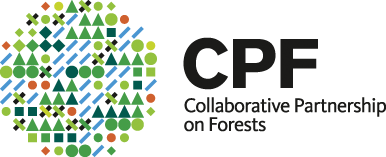CIFOR coordinates on behalf of the 14 organizations of the Collaborative Partnership on Forests
Collaborative Partnership on Forests
-
Centre for International Forestry Research (CIFOR)
CIFOR advances human well-being, environmental conservation and equity by conducting research to help shape policies and practices that affect forests in developing countries. CIFOR is a member of the CGIAR Consortium. Our headquarters are in Bogor, Indonesia, with offices in Asia, Africa and South America. www.cifor.org
-
Convention on Biological Diversity (CBD)
The CBD Secretariat supports the implementation of the Convention, which has three goals: conservation of biodiversity, sustainable use of its components, and sharing the benefits from the use of genetic resources in a fair and equitable way. The CBD addresses forest issues directly through its expanded program of work on forest biological diversity, with the ecosystem approach as the primary framework for action, and through its other thematic programmes of work and work on cross-cutting issues, including on traditional knowledge and protected areas. www.cbd.int
-
Food and Agriculture Organization of the United Nations (FAO)
FAO helps developing countries and countries in transition modernize and improve their agriculture, forestry and fisheries. The FAO Forestry Department champions a broad vision of sustainable forest management through policy advice, forest assessments and technical support to governments while fostering partnerships with civil society and industry in the implementation of national forest programes.
-
Global Environmental Facility (GEF)
The GEF provides grants to developing countries for projects and programs that benefit the global environment and promote sustainable livelihoods in local communities. As a financial mechanism for the three environmental conventions dealing with forests (UNFCCC, CBD and UNCCD), the GEF has been funding activities in the field of sustainable forest management since its inception in 1991. Of the GEF’s six focal areas, biodiversity, climate change and land degradation are particularly relevant to forests. www.thegef.org
-
World Conservation Union (IUCN)
IUCN is a conservation network of states, government agencies, nongovernmental organizations, scientists and experts. The goal of IUCN’s Forest Conservation Program is to enhance and optimize the contribution of forests and trees to rural poverty reduction, the long-term and equitable conservation of biodiversity and the sustainable supply of forest-related goods and services. www.iucn.org
-
International Tropical Timber Organization (ITTO)
ITTO promotes the conservation and sustainable management, use and trade of tropical forest resources. It develops internationally agreed policies and assists tropical member countries to adapt such policies to local circumstances and to implement them in the field through projects. As of 2009, it had supported more than 900 projects and activities with US$330 million in funding. www.itto.int
-
International Union of Forest Research Organizations (IUFRO)
IUFRO is a not-for-profit, nongovernmental international network of forest scientists. It promotes global cooperation in forest-related research and enhances the understanding of the ecological, economic and social aspects of forests and trees. It disseminates scientific knowledge to stakeholders and decision makers and contributes to forest policy and on-the-ground forest management. www.iufro.org
-
United Nations Convention to Combat Desertification (UNCCD)
The Secretariat works with member countries to implement the UNCCD. This convention is the only international, legally binding framework set up to address desertification and is based on the principles of participation, partnership and decentralization. The UNCCD focuses on improving land productivity, rehabilitating land, and the conservation and sustainable management of land and water resources. www.unccd.int
-
United Nations Development Programme (UNDP)
UNDP is the UN’s global development network, an organization advocating for change, and connecting countries to knowledge, experience and resources to help people build a better life. It operates on the ground in 166 countries. UNDP is an implementing agency for the Global Environment Facility. www.undp.org
-
United Nations Environment Programme (UNEP)
UNEP is the voice for the environment in the UN system. UNEP’s mission is to provide leadership and encourage partnership in caring for the environment by inspiring, informing and enabling nations and people to improve their quality of life without compromising that of future generations. UNEP is an implementing agency for the Global Environment Facility. www.unep.org
-
The United Nations Forum on Forests Secretariat (UNFF)
The UNFF provides support to the international policy dialogue on sustainable forest management. The UUFF is an intergovernmental body on global forest policy, which promotes management, conservation and sustainable development of all types of forests. The Secretariat works with a wide range of international organizations and stakeholders to facilitate cooperation and coordination on global forest issues. It serves as the focal point on all forest-related issues for the UN Department of Economic and Social Affairs and also serves as the Secretariat for the Collaborative Partnership on Forests. ww.un.org/esa/forests
-
United Nations Framework Convention on Climate Change (UNFCCC)
The UNFCCC provides the basis for concerted international action to mitigate climate change and adapt to its impacts. The UNFCCC Secretariat supports all institutions involved in the climate change process, particularly the Conference of the Parties to the UNFCCC. Among other things, the Secretariat is responsible for the publication, compilation and technical review of annual greenhouse gas inventories by Kyoto Protocol Annex I parties, including in the land-use, land-use change and forestry sectors, and the consideration of policy approaches and positive incentives to reduce emissions from deforestation in developing countries. www.unfccc.int
-
The World Agroforestry Centre
The World Agroforestry Centre, based in Nairobi, Kenya, is the world’s leading research institution on the diverse roles that trees play in agricultural landscapes and rural livelihoods. As part of the centre’s work to bring tree-based solutions to bear on poverty and environmental problems, its researchers, working in close collaboration with national partners, have developed new technologies, tools and policy recommendations for increased food security and ecosystem health. www.worldagroforestry.org
-
The World Bank
The World Bank’s mission is to reduce global poverty and improve living standards. Its forest strategy is built on three equally important and interlinked pillars: harnessing the potential of forests to reduce poverty, integrating forests into sustainable economic development and protecting global forest values. The World Bank is an implementing agency for the Global Environment Facility. www.worldbank.org/forests



















